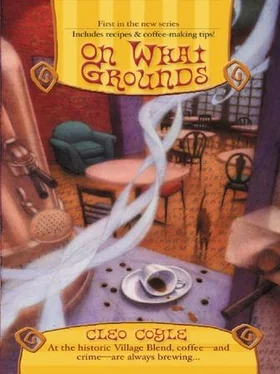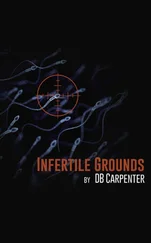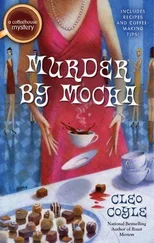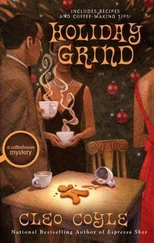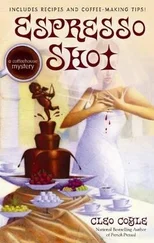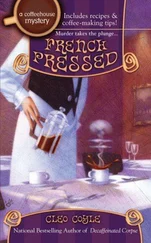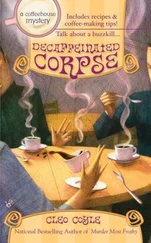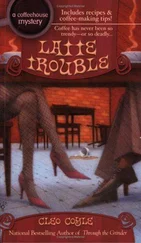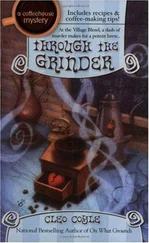I was surprised they hadn’t impounded the whole mess, but I guess they didn’t need foul old garbage stinking up their evidence room. And anyway, Detective Quinn had made it clear that everything about the scene and Anabelle’s body made the incident appear to be an accident, not a crime.
I gingerly unwrapped the wire tie on the top of the bag and opened the mouth. Inside was a second bag sealed with a wire tie as well. This was standard for the Blend. Coffee and espresso grounds, as well as tea leaves, are moist, so we use two bags behind the counter—one inside the other—as double protection against breakage or spillage.
After opening both bags, I peered inside, not quite sure for what I was searching. At first glance, the contents seemed typical enough. The bag was filled with off-white paper filters stained with coffee grounds, loose grounds, and caked grounds dumped from espresso baskets—some still retaining their packed circular shape hours after being discarded. Most of the paper filters were encrusted with dark black grounds that shined like oil under the harsh light. These were the remains of our famous French Roast—the Blend’s Brew of the Day on that unfortunate evening.
Pie-pan-sized paper filters from another urn were lined with a lighter, brown mass that resembled mud—which told me a Colombian bean had been brewed at one point (and that the beans had been ground too fine, which probably resulted in a bitter cup. I made a mental note to lecture the staff yet again on the proper grinding techniques).
Soiled napkins, disposable plates, and half-eaten pastry sat amid crushed cardboard cups, stirring sticks, paper towels, and other refuse, but none of it could be considered unusual—let alone incriminating.
I sighed.
So much for intuition.
And yet…I couldn’t dismiss my feeling that there was something here in this garbage bag that could shed some light on what had really happened a little over twenty-four hours ago.
I stared down at the contents of the plastic sack and realized that this foul garbage was possibly the last thing Anabelle saw before her tumble down the stairs. The morbid thought sent a slight shudder right through me, which is the reason I screamed like a banshee when I felt strong fingers grip my shoulder.
After the bloodcurdling noise echoed off the thick stone walls, a voice spoke—
“Good god, relax. It’s me.”
“Matt!”
“Didn’t you hear me coming down the steps?”
“I was lost in thought,” I said, my voice still shaking a bit from the scare. “What the hell are you doing down here anyway?”
“I found this bag of kitchen garbage leaking on the landing,” Matteo said, tossing the sack onto the pile. “I brought it down before it ruined the parquet.”
“I guess I dropped it when I came down here.”
“You dropped the garbage on the way downstairs to put the garbage out? Clare, are you feeling all right?”
“Forget it,” I said, facing him. It was then that I noticed the tiny espresso cup Matteo gripped in one hand.
His eyes followed mine. “I found it on the end table in the hallway,” Matteo explained. “Mario must have left it there after dinner. Joy was showing him the apartment, I guess.”
“So put it in the dishwasher,” I replied. “Unless you think it’s so polluted by that boy’s touch that you’re planning on throwing it away.”
There was a pause as I waited for Matt to say something.
“I think they were kissing,” he said.
I blinked. “That’s what two people who like each other tend to do,” I said evenly. “Usually they do it every chance they get.”
“So, you really think she likes him?” Matteo asked.
There was a touch of anguish in Matt’s voice that, to be honest, I couldn’t share. I had lived through too many of Joy’s grade school crushes, her junior high school dates, a summer fling, and even a serious high school romance to fret over yet another romantic interest in my daughter’s life. Of course, Matt was there for none of it, so this was all new to him. Poor man.
“Don’t you know how to read coffee grounds?” Matt asked.
Now that was a silly question, and certainly a leading one. My ex-husband knew perfectly well that I read coffee grounds the way some read tarot cards. I learned it from my grandmother, who learned it from hers.
I know, I know! It sounds ridiculously medieval. Yet it is an ancient art, and coffee ground and tea leaf divination—collectively known as tasseography—is a little like interpreting a work of art.
Coffee residue or tea leaves dry at the bottom of a cup to form a “picture.” Interpreting that picture is similar to gazing at clouds and trying to see the shapes of bunnies, locomotives, sheep, what have you. And as with cloud gazing, two people may see the same cloud and interpret it entirely differently.
One might see a mushroom, for instance, and another a mushroom cloud —which makes tasseography a kind of Rorschach test, too, since the person seeing the mushroom and the one seeing the nuclear detonation might just have slightly different worldviews.
In any event, to “divine” tea or coffee, you study the “picture” created by drying tea leaves or coffee residue on the bottom of a cup. You then let your subconscious loose to freely associate ideas.
When I was young, I thought it was a good party trick, and I often used it as a way to meet people, including boys. As the years passed, however, I learned that my divination skills with coffee grounds could be uncannily accurate. A few things happened that scared me. And I now did it only rarely.
“What do you see?” Matt said, waving Mario’s used espresso cup under my nose.
I wanted to turn away, but despite my better judgment I gazed into the depths of that cup. The remains of the coffee grounds had dried to form the distinctive shape of a hammer in the center of the cup. Around that hammer was a halo of stains shaped like licks of fire.
“Don’t be silly,” I said, pushing the cup away. “You know it’s just a parlor trick. And I haven’t done it in years. I can’t tell you anything more about that boy than you already know.”
“I know I don’t like him.”
“Fancy that.”
Abandoning my quest, I tied the garbage bag again. Out of habit, I tied the inner bag first. But as I was about to close the outer bag, I noticed a bulge on one side of the sack. A wad of garbage had ended up wedged between the two layers of plastic. From working behind the counter myself, I knew that happened sometimes, usually when some last-minute trash turned up after the inner bag, filled to the brim, had already been sealed.
I opened the outer bag wide and reached down between the plastic layers.
“What are you doing now ?” Matt said, clearly repulsed.
“Reading garbage,” I replied. “A whole other brand of divination.”
“Not if you count the supermarket tabloids. Didn’t they go through the late JFK Junior’s garbage on a fairly regular basis?”
“I guess that’s why they call it muckraking,” I said, poking around until my fingers closed on what felt like a mushy mass of cold, wet spinach. Steeling myself, I drew out the sloppy blob.
Matt watched over my shoulder as I opened my hand. A hand that was stained with a wad of used tea leaves. Green tea leaves, just about enough for a grande cup’s worth.
Anabelle herself was not a tea drinker, so she must have brewed it for someone else. No doubt, the tea leaves were wedged between the two bags because she’d already tied the first bag for the night when she’d tossed the leaves away. So brewing that tea must have been one of the last things she’d done that evening.
If I was correct, and someone had entered the store and assaulted Anabelle that night, then said person was a tea drinker .
Читать дальше
